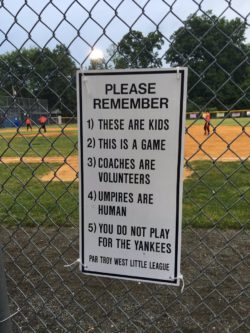Blog Archives
Long-time readers can skip the first paragraph if they remember this story.
The longest Christmas Party I ever attended was with my ex-girlfriend Julia. She was my ex-girlfriend at the time, and had been for about a week-and-a-half. I had broken things off a couple weeks before Christmas, and that was going to make things difficult for her. So I agreed, without much hesitation, to go to the family Christmas party and she would let everyone know we broke up after. Her brother’s then-girlfriend (now wife) didn’t like me for some reason. She got wind of it, and told everybody. But she didn’t tell me, or Julia, that everybody knew. Nobody said a word, but it was three hours of exceptionally cold treatment.
Last week was the Residency Dinner for my wife’s work. That’s where they honor the residents and instructing physicians, like my wife, are expected to be there. Which, hey, it’s free food and a nice night on the town. There are worse things.
One of my wife’s colleagues is on her way out, and not by her choice. In the jobs where my wife has worked, doctors aren’t fired but rather have contracts that are not renewed. The result is that you are fired way in advance of your departure date. Sometimes months. This can be kind of awkward because your final couple months there, everybody knows that you’ve been fired. And so it was this this doc. Except this doc, by dint of the occasion, was actually given an award. By the director that fired her. In front of a room full of people that know exactly what happened.
The thing is, this isn’t even the first time this has happened. It’s the first time it’s happened at this job, but it happened twice under her previous one (which did the same contract thing) at the “Physician Appreciation Dinner”. One involved a doctor who wasn’t fired, but was pressured to resign due to health reasons. But she had the social obligation to go to the PAD, be a part of the slideshow, accept some certificate thing, and be thanked for the job that she was being told not to do anymore. The other one was even more complicated, with a physician that was fired and then was mysteriously unfired. All in the run-up to the PAD.
It’s all kind of a surreal experience.
One that kind of hits close to home. In Arapaho, Clancy really got the sense that the only reason they didn’t fire her was because they couldn’t replace her. It’s not that she was bad at her job – in fact, none of the three mentioned above were actually bad at their jobs – but some people (or at least one person) just didn’t like her. But there was always a feeling like if they could just find someone else to do the job, they wouldn’t renew. Well, it’s good to be needed and all, but it’s not fun to work in a place where you are merely tolerated. Attending a PAD by people who are just tolerating you isn’t as bad as doing so when they just fired you, but it’s vaguely familiar.
I am happy to report that none of this is an issue at her current job. Her contract was renewed last week without much fanfare.
History of Europe:
War
War
War
War
War
War
War
Arguments about bananas.To be honest, I'll probably go with banana arguments. #remain
— Pavilion Opinions (@pavilionopinion) April 29, 2016
In the comment thread of my broken primaries post Over There, Michael Drew said the following:
There’s a literature on the Basic Purpose – I think it’s among other things (obviously) coordination around shared goals, and then disseminating (political) information (basically telling people why they might assent to this or that ruler). The rise of the media age therefore put parties significantly on their back feet compared to earlier times (not pre-media per se, but pre-the notion that a working-class individual might independently gather information from nonpartisan sources, look at who might be a good person to be a ruler, and make that decision on that basis, rather than only based on what the dominant party in their area or for their Group says would be best for them). Parties still do solve the coordination problem – you need to move from a population of a million having, say, 10,000 people they support for Ruler, which is maybe as far as non-partisan information sources could get us on their own, to say 10 or 100. My intuition is that parties exist even prior to what that literature suggests, or at least that they have to exist logically because of that last reason – there has to be some intermediation to get from Many to Few potential Leaders.
That’s a really basic, almost logically necessary reason that parties have to exist. But it’s not some kind of general permission slip from The Sky do what they want. In fact, to me, that they are maybe ordained by logic is precisely a reason to less-credit this claim that Hey, we’re just private membership organizations; unless you’re a member, you have no claim on how we behave.
It may be simply a numbers game, or it may be due to a limitation in human nature, but my intuition strongly tells me that we are condemned to do our politics through parties if we are going to try to govern polities larger than the classical Polis. If they’re that fundamental a part of human society in the age of Nations, then to me there is no reason that it should follow that they should be immune to claims about the demands of democratic justice, merely because they claim to be private organizations. They are seeking to fill a necessary purpose that is necessary to achieve public ends – the coordination of the choice about who gets the power to make and enforce laws (if there are laws). If they don’t want the public accountability that comes (should come, anyway) with that, then they can choose some other aims for their organization. If they’re doing things wrong, including not being accountable to the public (not just membership), then just by being a person trying to live in the society whose public life they seek to influence through coercive government, you have a claim against the ways they are doing wrong procedurally or substantively.
I wanted to unpack this a bit.
There is a natural question on what we mean by “parties,” and the distinctions are different when we talk about how much freedom to give, or not to give them. Parties can be informal alliances between factions in pursuit of a series of mutually-beneficial goals, or it can be a very formal arrangement of organization. The degree of formality given to the parties is quite relevant to the degree of freedom that we give them. Orientationally, the more formal the recognition a political party, the more rules that can be imposed.
In the United States, we have two competitive parties. We have a system that favors not only the number two, but that they be Republican and Democratic. This wasn’t always the case, but there is a reason that the Federalist gave way to the Whigs gave way to the Republicans and yet we’ve had the Republicans for 150 years. The parties adapt over time rather than become displaced, because the barriers to displacement have gone up considerably due to formal changes, such as public finances and party-listed ballots, and circumstantial change such as the nationalization of politics and media.
This may be desirable, or it may not be desirable. It is not, however, immutable. Parties may have existed for some time, as Drew says, but the formalization of politics was indeed a choice. There are a number of things we could do to loosen the grip of the Republican and Democratic Parties. I favor some (IRV) and oppose others (multimember districts), but they are options on the table. These are things that would create more options for parties, and give the existing two less leeway.
Alternately, we can devalue the notion of political parties. We couldn’t eliminate them even if we wanted to, but parties are given quite a bit in the way of privileges. States often pick up the tab for primaries, for example. They also put party affiliation on the ballot, which they don’t have to do (and in some city elections, as well as in Nebraska, they don’t). That’s not even getting into guaranteed ballot access, public financing, and other deferential behavior. All of which may be advantageous to the public at large, but none of it is necessary. Pulling the rug out of those benefits would be extremely disadvantageous for the parties, who would have to foot the bill to communicate to voters who their members are, and would have less leverage over the candidates and office-holders generally.
You can look at cities and heavily-tilted states to have an idea of what informal parties might look like. Back in Colosse, partisanship exists but city elections are non-partisan. No non-Democrat has been elected mayor in recent history, but at any given time there are some on the city council. But where the real partisanship occurs tends to be on the informal level. There is almost always a liberal faction and a moderate/conservative faction. People who follow politics tend to know who is on whose teams, though because it’s not a part of the election process there is more flexibility. A moderate Democrat, for example, knows that when she is up for re-election, she can pick up conservative endorsements and votes to make up for ones lost. There is still a natural pull away from the center because term limits force them to look at running in partisan elections later, but it’s none-the-less a functioning system.
Is an ideal system? That’s a judgment call. But either way, there are options available. What does seem clear to me, though, is that the more privilege we give parties, the more we can ask of them. There are, however, limits to this.
While I believe that there are various levers to be pulled, I believe there is a Permission Slip From The Sky of sorts, in the form of Freedom of Association. We can force parties to make the difficult decision between financing their own primaries or losing ballot designation and having their own nomination mechanisms, but we ultimately can’t make the decision for them. And we can’t say “We want the formal parties, and we want to impose these obligations on you so that we can have them precisely the way we want them.”
All of this is something of a moot point, though, because parties are the government, and the government are parties. Except in states with a referendum process, the parties themselves are gatekeepers of policy. I would like to see some reforms that would open the system up a bit and allow parties to be more easily displaced, but you know who has not only the motivation but the power to prevent that from happening? The existing parties. So even in systems with more flexible party structures, such as Canada, reform is difficult. Almost any substantive reform would hurt one party or the other at least, and would leave both more vulnerable in the long run. And with party leadership threatened to a degree it hasn’t been before, it seems more likely than not that both parties are more likely to want to tighten, not loosen, their hold on the democratic process.
Photo by DonkeyHotey 
 Megan McArdle’s post about Brexit is worth a read. I thought of it when I was reading this.
Megan McArdle’s post about Brexit is worth a read. I thought of it when I was reading this.
While the University of Texas at Austin seeks diversity through affirmative action, Texas A&M went another route.
Vaping is not just for nicotine. I am increasingly envisioning a future wherein I will be assuring police officers that my vaporizer has marijuana in it and not nicotine so leave me alone.
No, CT May is wrong. Ghostbusters really was a good film, and holds up pretty well.
As Uber and Lyft pull out of Austin, others move in and drunk driving may be going up.
Americans have a love affair with European cities, but in looking for inspiration a couple of urbanists say we should really be looking at Canada.
 There used to be concern that people were not waiting long enough to find a good made. Now there is concern that they are waiting too long.
There used to be concern that people were not waiting long enough to find a good made. Now there is concern that they are waiting too long.
Well this is a shock: If you’re agreeable, attractive, and clean, you’re more likely to get married. The good news is that if you’re low in one, you can try to bone up on the other.
Roberto Ferdman interviews Stanford sociologist Michael Rosenfeld about the success of online dating.
The Book of Life has a primer on how to break up with somebody. The “be cruel to be kind” is probably right.
Vaclav Smil argues that advanced economies can’t leave manufacturing behind. He seems to be sort of arguing that we can’t because manufacturing employment is helpfully labor-inefficient, though.
It really does seem like one of the three most important things about Universal Basic Income is the extent to which we can expect the poor to mind their money carefully… and what we do if they don’t.
From the Daily Nebraskan, an interesting article on young people making the transition from home school to college. Also, homeschooling for heathens.
Taking a test? Best dress up.
This is aggressively unsurprising: Professors with more and better career alternatives make more than those without.
Here are some actors reading for parts in The Office:
It’s hard to say for sure since there is almost certainly some status quo bias going on, but I think they largely made the right choices.
Seth Rogan is very unimpressive as Dwight, but Judah Friedlander (who played Frank on 30 Rock) could totally have pulled it off in the direction I think he would have taken the part.
Bob Odinkirk is a good Michael Scott, but we knew that because he played a doppleganger in a late episode of the season.
Adam Scott was passable as Jim.
 According to some research, conspiracy theorizing really is a BSDI thing.
According to some research, conspiracy theorizing really is a BSDI thing.
This is one of the best liberal pieces on gun control I have ever read.
Well, when you put it that way, Trump is kind of ridiculous. (Or any other way, while we’re at it.
Ryan Cooper argues that the EU screwed up and that contributed to what increasingly looks to be a bad vote on the Brexit. Maybe. Or maybe the EU as it was imagined was not a great idea because you can’t turn peoples into a people by government fiat without speartips?
As we rush to (rightly) condemn rapist Brock Turner, it’s worth pointing out that sex offender registries are still questionable in terms of efficacy and justice.
Japan Times looks at the Japanese custom of having kids clean up the classroom. Note, however, that contrary to rumor they do actually employ custodians.
It turns out, giving away condoms may not be the best way to reduce teen births. At least, not without counseling.
Third grade? I didn’t learn cursive until the fifth, and that was back when it was a relevant skill.
Josh Blackman argues that the government cannot actually mandate that employers, landlords, and so on use of preferred pronouns.
The description of the plot of Neon Genesis Evangelion here is off, but I do kind of think that Asuka might actually be a Trump fan if they existed in the same universe.
Noah Smith is worried about Canada becoming a petrostate. Well, diversification is good, but oil per se isn’t precisely Russia’s or Nigeria’s problem, and the fact that the only other liberal democracy that is a petrostate is just fine, I suspect that’s where you would look for the good and the bad.
The Southern Baptists are going after the Confederate Flag. This… is a very good thing.
Dixie, land of the gender pioneers.
Eli Lake reports that somewhere along the way, Natan Sharansky became a realistic.
I did not know this was a thing, but apparently Hasidic Jews in New York have their own private police force.
{Ed note: The numbers are off in the tweets. She repeated nine and then skipped twelve.}
Ok wait seriously here's a list of some of what's alleged to have happe11ned with the Oakland police department: 1) a cop kills his wife
— Saque de Banda (@aurabogado) June 18, 2016
2) fellow officers help him cover up the crime, and the dead cop's wife death is ruled a suicide
— Saque de Banda (@aurabogado) June 18, 2016
3) that same cop, who people now believe killed his wife, commits actual suicide
— Saque de Banda (@aurabogado) June 18, 2016
4) the cop leaves behind a suicide note that reveals that him, and some of his fellow officers, had been raping a child trafficking victim
— Saque de Banda (@aurabogado) June 18, 2016
5) apparently, an investigation begins to reveal that several officers have, in fact, commuted child rape
— Saque de Banda (@aurabogado) June 18, 2016
6) after the child trafficking victim turns 18, more cops start paying her for sex; some of this happened in the Oakland PD parking lot
— Saque de Banda (@aurabogado) June 18, 2016
7) as the investigation continues, it's alleged that the Oakland PD chief's wife knew about the child trafficking victim rape all along
— Saque de Banda (@aurabogado) June 18, 2016
8) for this, and possibly additional reasons, Oakland PD chief steps down: whether he knew what his wife knew or not, he's unfit to lead
— Saque de Banda (@aurabogado) June 18, 2016
9) the Oakland PD chief's wife publicly tweets that "it's bullshit" right after her husband is fired
— Saque de Banda (@aurabogado) June 18, 2016
9) Oakland's mayor says the chief stepped down for "personal reasons." Girl I GUESS if you call knowledge of child rape a personal thing
— Saque de Banda (@aurabogado) June 18, 2016
10) muck racking reporters break the lid off the story and Oakland's mayor doubles down, basically saying they're lying
— Saque de Banda (@aurabogado) June 18, 2016
11) new chief is sworn in but may or may not be connected to child rape case. For whatever reason, he also steps down after a few days
— Saque de Banda (@aurabogado) June 18, 2016
13) a new NEW Oakland PD chief is sworn in and the mayor says he's great and stuff but apparently not because he steps down after two days
— Saque de Banda (@aurabogado) June 18, 2016
14) meanwhile a new scandal, this time surrounding blatantly racist, kkk and n-word having texts from Oakland PD, has emerged
— Saque de Banda (@aurabogado) June 18, 2016
15) Oakland's mayor is somehow still at her job, decides that there just won't BE a police chief because that's how rotten the department is
— Saque de Banda (@aurabogado) June 18, 2016
16) one murder, a cover-up, a suicide, child rape, racist texts, 3 police chiefs in one week; mayor asks the public to trust the process
— Saque de Banda (@aurabogado) June 18, 2016
Photo by THE Holy Hand Grenade! 
 Like it or not, Maajid Nawaz really was a Muslim, and liberals can’t let Trump have the issue.
Like it or not, Maajid Nawaz really was a Muslim, and liberals can’t let Trump have the issue.
The race to determine the motive of the Orlando shooter hasn’t been a fun ride. Everybody thinks everybody else looks silly because the newest revelation makes it so obvious.
Breaking: If you have a clean record you can easily buy a gun. Relatedly, this might be misleading. I know at least two people who have firearm dealership licenses simply so they can buy, sell, and trade for their collection, rather than being meaningful dealers in the way that people imagine.
Avi Woolf’s piece on political correctness is a little too blaming-the-outsiders-for-Trump, but otherwise a solid perspective.
The calm, sensible period is going away. Replaced by a lot of needless overpunctuation. Somewhere in here is a metaphor for the Republican Party.
Gawker may get out of the Hogan payout with some creative bankruptcy.
 Cool: A london startup is helping Mongolian nomads get their mail.
Cool: A london startup is helping Mongolian nomads get their mail.
Poland is apparently cracking down on the whole Internet Freedom thing.
Trevor Aaronson argues that the FBI’s “pursue every lead” policy actually helped the Orlando shooter slip away.
Education does police officers good. Or perhaps more accurately, having educated officers does police departments good.
Limiting flavors and taxing ecigarettes is a good way to reduce ecigarette use. Among current smokers, at least.
I always thought the GoBots origin was way more interesting than Transformers. Cracked has a list of dark toy origin stories.
 We’ve moved around a lot and will probably move at least one more time. Which I hate because I’m tired of moving. Going forward, I worry more about this.
We’ve moved around a lot and will probably move at least one more time. Which I hate because I’m tired of moving. Going forward, I worry more about this.
The physical (as opposed to voice) actor for ALF died. I didn’t know they even had an actor. I thought the few times they couldn’t use a puppet, they just had a rent-a-child-actor in there. (Does anyone else remember the trauma-inducing conclusion to that show’s run? Holy hell.)
Race relations in the US are, compared to the rest of the world, pretty good and getting better.
If there’s one thing we can take for granted, it’s that authoritarians veer Republican. Everybody knows this. Science says so. You don’t have science, do you? If you do, you’re probably a Republican.
So when a study in the American Journal of Political Science found more data points to confirm what we already know, it got a lot of coverage. As researcher Steven Ludeke says:
The erroneous results represented some of the larger correlations between personality and politics ever reported; they were reported and interpreted, repeatedly, in the wrong direction; and then cited at rates that are (for this field) extremely high. And the relationship between personality and politics is, as we note in the paper, quite a “hot” topic, with a large number of new papers appearing every year.
The problem, as you may have heard, is that it’s exactly backwards. It is not conservatives that have the propensity for psychoticism, like authoritarianism, but liberals. It is not liberals that that are so wonderfully into social desirability, but conservatives. They read the data the wrong way. How could this have happened? Fortunately, they explain it for us:
In line with our expectations, P [for “Psychoticism”] (positively related to tough-mindedness and authoritarianism) is associated with social conservatism and conservative military attitudes. Intriguingly, the strength of the relationship between P and political ideology differs across sexes. P‘s link with social conservatism is stronger for females while its link with military attitudes is stronger for males. We also find individuals higher in Neuroticism are more likely to be economically liberal. Furthermore, Neuroticism is completely unrelated to social ideology, which has been the focus of many in the field. Finally, those higher in Social Desirability are also more likely to express socially liberal attitudes.
One almost wonders what might have happened if they’d read the results correctly. Results that did not conform to their expectations? Let us look, for a moment, Richard Feynmann talking about the hard sciences:
We have learned a lot from experience about how to handle some of the ways we fool ourselves. One example: Millikan measured the charge on an electron by an experiment with falling oil drops and got an answer which we now know not to be quite right. It’s a little bit off, because he had the incorrect value for the viscosity of air. It’s interesting to look at the history of measurements of the charge of the electron, after Millikan. If you plot them as a function of time, you find that one is a little bigger than Millikan’s, and the next one’s a little bit bigger than that, and the next one’s a little bit bigger than that, until finally they settle down to a number which is higher.
Why didn’t they discover that the new number was higher right away? It’s a thing that scientists are ashamed of—this history—because it’s apparent that people did things like this: When they got a number that was too high above Millikan’s, they thought something must be wrong—and they would look for and find a reason why something might be wrong. When they got a number closer to Millikan’s value they didn’t look so hard. And so they eliminated the numbers that were too far off, and did other things like that. We’ve learned those tricks nowadays, and now we don’t have that kind of a disease.
A good thing, that! Then there’s no problem, right? Let us consider, for a moment, the dangers of cell phones on the roads. Some scientists look at it recently and found themselves quite surprised to find that cell phone bans resulted in no reduction in accidents:
Interesting. So they got a result that didn’t seem right to them, so they kept investigating. They tried to control for every single factor in search for a particular answer, and they didn’t find it. This is science working. Except, of course, if you consider if some factor gave them the result they were expecting. If some fluke or uncontrolled-for-factor had given them the reduction they were looking for, that cell phone bans result in fewer accidents wouldn’t be wrong or unproven, it would be scientific fact.“We were expecting to find maybe a five to ten percent reduction in accidents. We had read the studies that talking on your phone is as dangerous as drinking and driving. But even after controlling for gas prices, miles traveled, rainfall, and holidays—all factors that impact traffic patterns, road volume, and crashes—they found no impact on the rate of accidents.
“Only after spending a ton of time looking at the data, slicing it in different ways, we eventually came to the conclusion that there was no evidence of a decline in accidents. It took a while for us to convince ourselves that there wasn’t something there.”
Now, imagine that we’re not talking about the unforgiving hard sciences. Imagine we’re not talking about something as technocratic as cell phone bans, but matters of social political theory. The difference in most of our minds between right and wrong. While we’re at it, imagine that you’re investigating the foot soldiers of right and the foot soldiers of wrong. I don’t know what you imagine, but I imagine that if you are getting results that are “in like with your expectations”, your normative expectations, how likely are you to double-check the findings? How likely are you to wonder if perhaps you are using the wrong test to determine what is and is not authoritarian? In this case, maybe they wouldn’t have because they say that which attributes to which side of the gradient wasn’t the point of the study. Maybe they would have looked at the results and said, “Huh. Maybe we’re the authoritarians.”
I mean, it’s not actually impossible. Science! Heck, it’s possible that the researchers themselves were conservative and were not the least bit surprised to find out about their own authoritarian streak. Maybe they wore it as a badge of honor. Maybe, maybe, maybe. Or maybe they are, in fact, human. Maybe they came into it with their own suspicions about how people divide themselves into liberal and conservative and maybe, just maybe, that influenced their thinking. And maybe sometimes “reality has a liberal bias” because those whose job it is to (scientifically!) determine reality, approach it from the point of view of human beings with their own expectations and impressions.
You can move beyond the scientists themselves and to another step. If you’re an academic journal, are you more likely to scrutinize the methodology of something that brings an unexpected, or unpleasant result? Or are you going to approach both of them with absolute neutrality because science? Well?
 This sounds right to me. They may be tacky, and the food may not be good for you, but other than that it’s as good a social hub as anything that isn’t free, and it’s cheaper than coffeehouses.
This sounds right to me. They may be tacky, and the food may not be good for you, but other than that it’s as good a social hub as anything that isn’t free, and it’s cheaper than coffeehouses.
I’m not a big James Patterson fan, but it’s hard not to admire his thirst for innovation.
Good news! Payday lenders will not be so easily thwarted by those laws.
I largely find myself in agreement with this. Which is why, while I’m not alarmed by Thiel’s involvement, I was alarmed by the outsized verdict that is causing Gawker’s bankrupcy.
Conor Sen reports that the US manufacturing renaissance, such as it was, is probably over.
If vapers can’t vape, at least half are worried about going back to smoking. The good news is that as long as they can vape…
I would bet you money that Kim Jong Un believes himself to be immune to lung cancer. I mean, what, would you tell him?!
For parties ostensibly on opposite sides, the parallels between the Republicans and Labour can be spooky sometimes.
Faster, please.
Laser Tag Island! Pretty cool concept.
Here’s a pretty cool calculator on whether it’s advantageous to rent or buy.
We must go to the moon Titan, so that we can extract its oil.
Here is definitely a place that solar power could come in especially handy: Remote cellular towers.
Ted Bromund looks at the history of the US-UK relationship.
How will international law influence a civil society in space? This space lawyer is so glad you asked.



